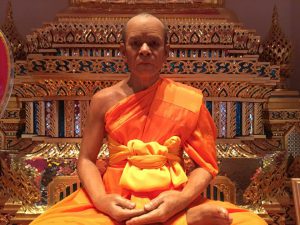Get Easy Health Digest™ in your inbox and don’t miss a thing when you subscribe today. Plus, get the free bonus report, Mother Nature’s Tips, Tricks and Remedies for Cholesterol, Blood Pressure & Blood Sugar as my way of saying welcome to the community!
Improve focus and concentration through meditation

The practice of meditation is thousands of years old and there are many ways to do it.
In the U.S., the methods of mindfulness meditation and transcendental meditation are most popular. Yet, there are perhaps countless traditions and methods of meditation.
I recently spent time meditating at Wat Mongkoltepmunee, a Thai Buddhist temple in Bensalem, PA, with my friend Dr. Luke Jih, practicing a method of meditation in the Theravada Buddhist tradition. It utilizes a nice double focus to help you quiet your mind and be in the moment.
If you’re new to meditation, you might find this method particularly helpful…
Restoring the Pure Mind
According to the Theravada tradition, the pure state of the mind is clean, clear and luminous. Yet, because of over stimulation, too much thinking, stress and worries that enter the mind through our five senses, the emotions of like and dislike flood our thoughts. From minute to minute our focus and thoughts change and wander and change again.
In order to make the mind clean and clear and luminous again, we must bring it to a single point of attention in meditation. The method to do this is twofold, yet simultaneous: at the same time you must visualize a clear crystal ball while mentally reciting the mantra, “Samma-Araham.”
 The mantra means “the righteous absolute of attainment of a human being.” It is believed that this mantra produces a mental vibration that helps move your awareness and concentration to the center of the body.
The mantra means “the righteous absolute of attainment of a human being.” It is believed that this mantra produces a mental vibration that helps move your awareness and concentration to the center of the body.
When used together, the visualization and mantra will help control the wandering mind, focusing its positive and peaceful energy in the body.
How to Meditate
The directions given at the temple for proper posture are as follows:
- Sit comfortably in the half lotus position.
To do that, sit upright with your back and spine straight, cross-legged with your right leg over the left one. You can sit on a cushion or pillow to make your position more comfortable. Nothing should impede your breathing or circulation. Your hands should rest palms up on your lap, and the tip of your right index finger should touch your lefty thumb. Feel as if you are one with the ground on which you sit. Feel that you could sit happily for as long as you like.
- Gently close your eyes.
Relax every part of your body, beginning with the muscles in your face. Then relax your neck, shoulders, arms, chest, lower torso, and legs. Make sure there is no sign of tension on your forehead or across your shoulders.
- Feel as if you are sitting alone.
Around you is nothing and no one. Create a feeling of happiness and spaciousness in your mind. Imagine that you are sitting alone in the blue sky without any cloud.
- Visualize the image of a clear crystal ball.
Move this ball through the seven “bases” of the body: 1) Nostrils, 2) Bridge of the nose, 3) Center of head, 4) Roof of mouth, 5) Center of throat, 6) Center of stomach, behind the navel; 7) two finger widths above navel.
Benefits of meditation
Meditation has a visible and measurable impact on your health. In studies using MRIs, researchers examined the brains of meditation participants to find a clear decrease of the grey matter in the parts of the brain known as the amygdalae (which help us deal with stress and anxiety and controls the ‘fight or flight’ response). Additionally, the MRI showed an increase of gray matter in the hippocampus (the area that controls memory and learning).
With a daily practice of at least 20 minutes, you can achieve the many benefits of meditation in a short time, including: calmness, stress reduction, clarity of thought, better focus, increased concentration, a sense of peace, reduction of anxiety and lower blood pressure. Eventually, you will deeply understand the truths of life. What more could you ask of 20 minutes in a day?
Editor’s note: The number of people with Alzheimer’s disease in the U.S. is expected to triple by 2050. And there’s a very suspicious reason: 38.6 million Americans take a single drug every day that robs their brain of an essential nutrient required for optimal brain health. Are you one of them? Click here to find out!












